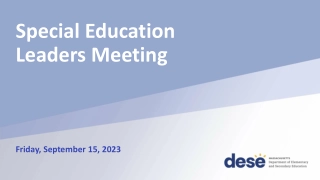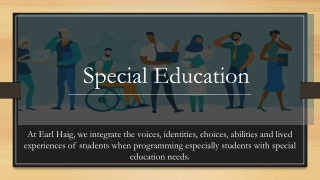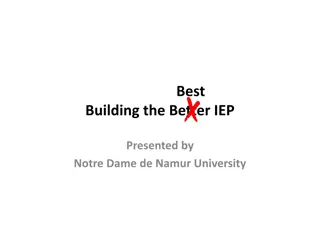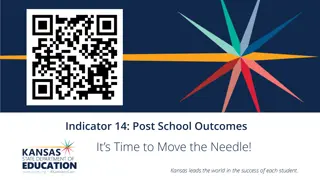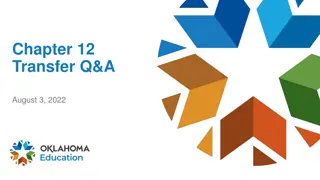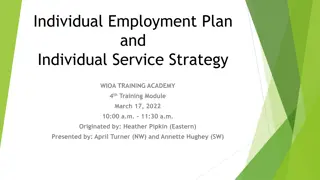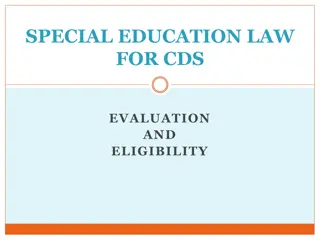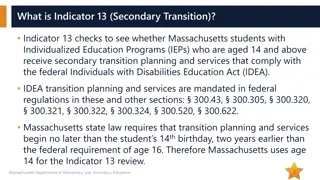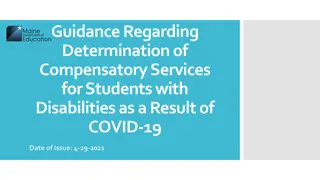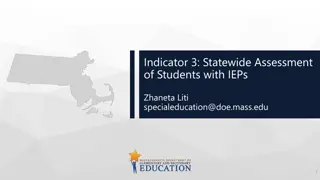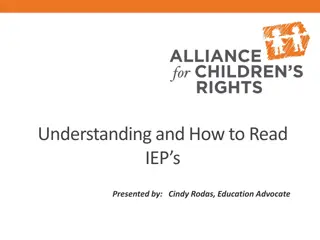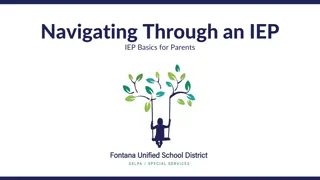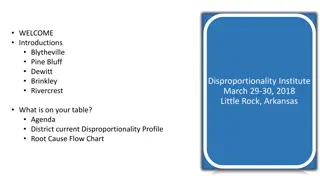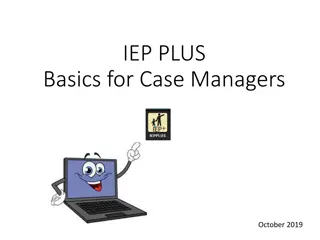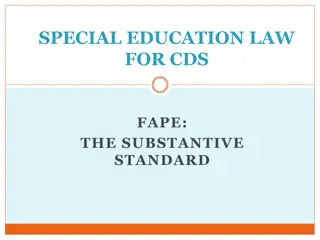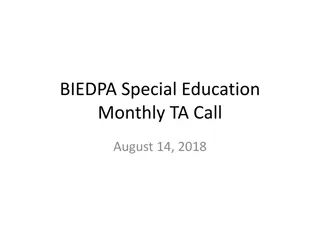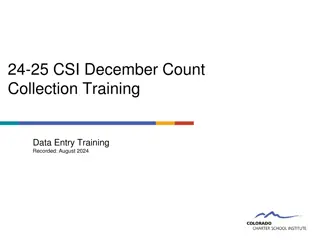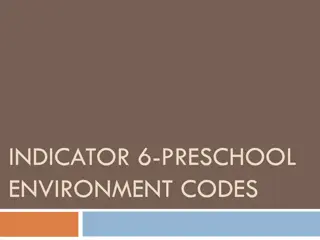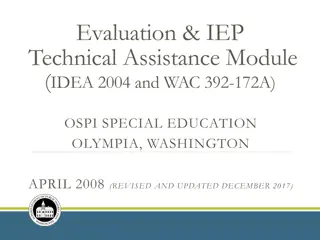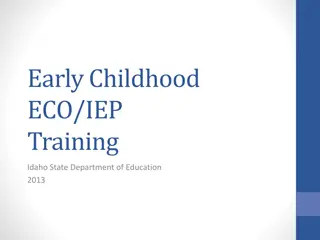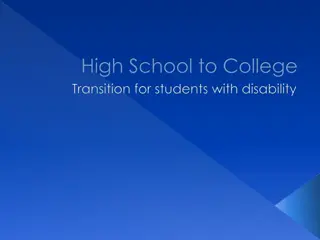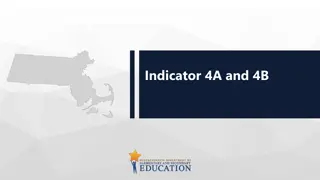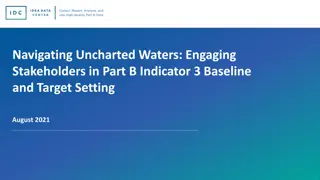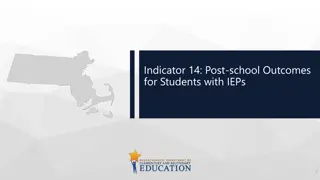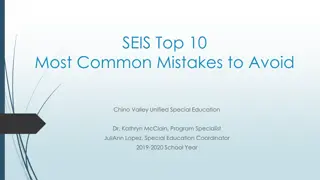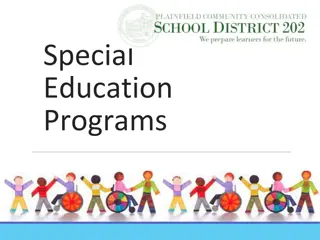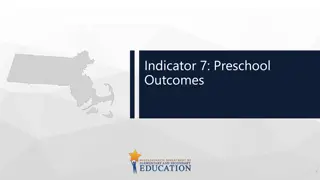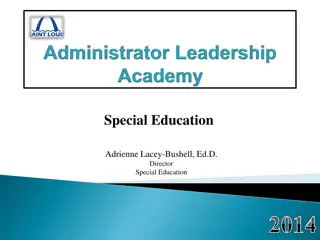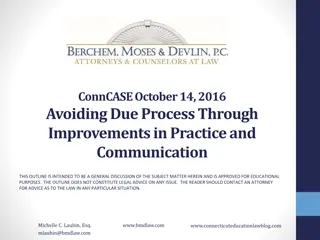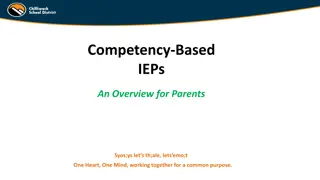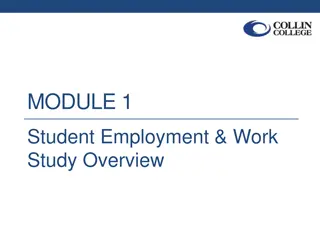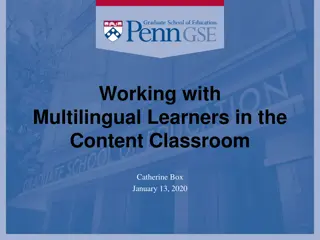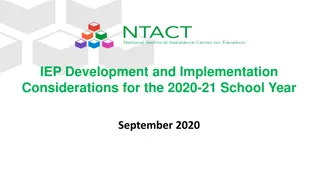Special Education Leaders Meeting
The Special Education Leaders Meeting to receive updates on IEPs, general supervision, and DESE's educational vision. Learn about services provided in institutional settings and how to partner with local school districts.
3 views • 40 slides
Disability Inclusion Checklist for School Leaders
This checklist guides school leaders on implementing Disability Inclusion activities annually. Covers policy, funding, professional learning, IEPs, SSG processes, community engagement, and resource allocation.
0 views • 5 slides
Special Education
Integrating student voices, identities, and abilities, we offer specialized programs at Earl Haig for students with special education needs. Our team includes various professionals to support students effectively. Students with IEPs can take Learning Strategies courses to enhance their skills in lit
0 views • 5 slides
Post-School Outcomes Data Collection Updates for 2023
This information provides details on Indicator 14 data collection for post-school outcomes in 2023, focusing on assessing the success of educational efforts for students with IEPs one year after leaving high school. It covers the importance of Indicator 14, what it entails, changes for 2023 and beyo
3 views • 32 slides
AAA Assessment and Accountability Monthly Call - February 20, 2024
The AAA Assessment and Accountability Monthly Call on February 20, 2024, covers important topics like Accommodations, LEAP 2025, ELPS/ELPT, ACT, and K-3 Literacy. It emphasizes the need for timely completion of IEPs/IAPs/EL Checklists and provides details on Tests Read Aloud Options and changes in s
0 views • 37 slides
Special Education Leaders Meeting
The DESE Special Education Leaders Meeting on June 23, 2023, focused on promoting antiracist, inclusive, and culturally sustaining practices in education. The agenda included updates on MCAS Alternate Assessment, new literacy screening guidance, and discussions on DESE's Educational Vision. Addition
0 views • 32 slides
Best Practices for Special Education Case Management Workshop
This workshop presented by Notre Dame de Namur University focuses on equipping learners with the best practices in special education case management. Participants will gain knowledge on SpEd case management, collaboration strategies, and creating legally defensible IEPs. The workshop covers topics s
7 views • 214 slides
Special Education Hot Topics Overview September 2023
Explore the key subjects covered in the Special Education Hot Topics session for September 2023. Topics include state plan updates, compliance reminders, reading success plans, and more. Get insights on regulations, FAPE, IEPs, and LRE responsibilities. Discover the meeting norms and objectives for
0 views • 67 slides
Understanding the Role of Board-Certified Behavior Analysts in Supporting Students with Autism in PA School Programs
Pennsylvania Training and Technical Assistance Network (PaTTAN) plays a crucial role in supporting students with autism through the efforts of Board-Certified Behavior Analysts. The increasing number of students eligible for IEPs under the definition of autism necessitates skilled educators who can
0 views • 20 slides
Improving Post-School Outcomes for Youth with Disabilities
In Kansas, transition services for students with disabilities have evolved over the years to focus on successful outcomes after high school. Indicator 14 measures the percentage of youth with IEPs who enroll in higher education or gain competitive employment within one year of leaving high school. T
1 views • 27 slides
Guidelines for Student Transfers and IEPs in Oklahoma Schools
This document outlines procedures for student transfers in Oklahoma schools, specifically focusing on transfers for students with disabilities. It covers aspects such as transferring students with expired IEPs, revocation of disability recognition, and the process for move-in students within the sta
0 views • 7 slides
Understanding Individual Employment Plan (IEP) and Individual Service Strategy (ISS) in WIOA Training Academy
Individual Employment Plan (IEP) and Individual Service Strategy (ISS) are essential components of the WIOA Training Academy, tailored to meet the career needs of participants under various WIOA programs. IEPs focus on personalized career services for adults and dislocated workers, while ISSs are sp
1 views • 23 slides
Special Education Law and Evaluation Process for CDS Eligibility
Understanding special education law and the evaluation process for Children with Disabilities (CDS) is crucial for determining eligibility, developing Individualized Education Programs (IEPs), and monitoring progress. Key steps include IDEA requirements, obtaining informed consent, conducting evalua
0 views • 28 slides
Understanding Massachusetts Indicator 13 for Secondary Transition Planning
Indicator 13 in Massachusetts assesses the compliance of secondary transition planning and services for students with IEPs aged 14 and above, ensuring adherence to federal laws. The state collects data through file reviews to calculate a statewide compliance rate aiming for 100%. Compliance is measu
0 views • 5 slides
Ensuring Compensatory Services for Students with Disabilities Post-COVID-19
Educational guidance emphasizes providing compensatory services for missed specially designed instruction and related services due to the pandemic, ensuring the fulfillment of a Free Appropriate Public Education (FAPE) for students with disabilities. The individualized determination of compensatory
0 views • 16 slides
Statewide Assessment of Students with IEPs - Overview
Indicator 3 focuses on the assessment of children with Individualized Education Programs (IEPs) in Massachusetts. It includes participation rates, proficiency rates against regular and alternate academic achievement standards, and gap analysis. The data is sourced from the Massachusetts Next Generat
1 views • 7 slides
Understanding and Reading Individualized Education Plans (IEPs) by Cindy Rodas: Key Insights
Gain valuable insights on understanding and reading Individualized Education Plans (IEPs) through this educational presentation by Cindy Rodas, an Education Advocate. Learn about the components of IEPs, examples, and essential tips. Explore topics such as the basics of Special Education, identifying
0 views • 24 slides
Understanding IEP in Special Education: A Comprehensive Guide for Parents
Exploring the components and requirements of Individualized Education Programs (IEPs) in special education, this guide delves into navigating through an IEP, learning goals for educators, Fontana SELPA's mission, and understanding procedural safeguards for parents. It emphasizes the importance of pa
1 views • 39 slides
Analysis of Disproportionality in Special Education Disciplinary Practices
This document delves into the issue of disproportionality in special education disciplinary practices, focusing on suspension and expulsion rates among students with Individualized Education Programs (IEPs). It highlights significant differences in rates based on race/ethnicity and outlines indicato
2 views • 10 slides
IEP Plus Basics for Case Managers - Essential Guidelines and Tips
Discover the essential guidelines and tips for using IEP Plus as a case manager in October 2019. Learn about searching for students, creating and editing IEPs, data considerations, saving techniques, adding needs, services, and goals, and more. Enhance your efficiency in managing student IEPs with t
0 views • 23 slides
Understanding Special Education Law for Children with Disabilities (CDS)
Special Education Law for Children with Disabilities (CDS) emphasizes the FAPE standard, IDEA process, and FAPE requirements such as procedural aspects, substantive standards, and the provision of meaningful educational benefits. Court cases like Rowley (1982) and Endrew F. (2017) have shaped the im
0 views • 27 slides
Updates and Reminders for Special Education Staff
The provided content outlines various updates and reminders for special education staff members, including important dates, monitoring visits, determinations, due dates, guidance for teachers, and information on fund distribution documents. It emphasizes the significance of providing services to stu
0 views • 21 slides
Enhancing IEP Quality: Strategies and Implementation Insights
Explore how to distinguish compliant IEPs from quality IEPs through the guidance provided by the CDE IEP Procedural Manual. Learn about gathering students' strengths, preferences, and interests, and assessing their present levels of academic achievement and functional performance. Discover strategie
0 views • 18 slides
CSI December Count Collection Training for Special Education Data Entry
This training focuses on accurately recording data about students with Individualized Education Programs (IEPs) to ensure schools receive appropriate funding and resources. It includes information on the purpose of SPED data entry, the annual December count of special education students, coding scen
0 views • 12 slides
Understanding Indicator 6: Preschool Environment Codes
This information provides insights into Indicator 6, focusing on the percentage of children ages 3 through 5 with Individualized Education Programs (IEPs) attending regular early childhood programs versus separate special education classes. It delves into the definitions of regular early childhood p
0 views • 29 slides
Evaluation & IEP Technical Assistance Module - Special Education Overview
This module provides guidance on evaluations, IEPs, and special education for individuals with disabilities under IDEA 2004 and WAC 392-172A. It covers components, evaluations, reevaluations, prior written notice, consent, specially designed instruction, present levels, measurable annual goals, IEP
0 views • 109 slides
Early Childhood IEP Training Workshop Agenda
This training workshop organized by the Idaho State Department of Education in 2013 focused on helping professionals in early childhood education identify and collect information needed to complete new Early Childhood IEP practices. The agenda included sessions on screening materials, transition str
0 views • 67 slides
Transitioning from High School to College with Disabilities
Explore the transition process from high school to college for students with disabilities, including Individualized Education Plans (IEPs) under IDEA, 504 Plans, differences in services between high school and college, and the historical background of the Americans with Disabilities Act (ADA).
0 views • 17 slides
Analysis of Massachusetts' Indicators 4A and 4B on Student Discipline Practices
Massachusetts uses Indicators 4A and 4B to monitor significant discrepancies in the suspension or expulsion rates of students with Individual Education Plans (IEPs) and in racial and ethnic subgroups. The state sets specific criteria to identify districts with substantial disparities and requires th
0 views • 6 slides
Understanding Changes in Stakeholder Engagement for Indicator 3 Baseline and Target Setting
Explore the modifications in Part B State Performance Plan/Annual Performance Report (SPP/APR) Indicator 3 concerning children with IEPs on statewide assessments. Discover new requirements for stakeholder and parent engagement, gain insights into strategies for engaging stakeholders, and grasp the d
0 views • 30 slides
Understanding Indicator 14: Post-School Outcomes for Students with IEPs
Indicator 14 is a crucial measure used to assess the post-school outcomes of students with IEPs one year after they leave high school. It focuses on whether these students are enrolled in higher education, competitively employed, or engaged in other postsecondary education or training programs. Mass
0 views • 8 slides
Avoiding Common Mistakes in Special Education IEP Processes
Understand how errors in spelling names, submitting incomplete IEPs, incorrect service dates, and other common mistakes can impact compliance. Specific guidelines are provided to ensure accurate and complete IEP documentation in Chino Valley Unified Special Education program for the 2019-2020 school
0 views • 13 slides
Understanding Special Education Programs and Services
Explore the least restrictive environment (LRE) continuum for students with disabilities, ranging from general education classrooms to specialized programs. Learn about a variety of programs and services tailored to meet individual needs, including resource services, co-teaching, and instructional s
0 views • 20 slides
Understanding Preschool Outcomes: Indicator 7 Insights
Explore Indicator 7 focusing on preschool children with IEPs and their improvements in social-emotional skills, knowledge acquisition, and appropriate behaviors. Learn why Indicator 7 is crucial for development and learning, see data measurements, targets for upcoming years, and access additional va
0 views • 7 slides
Understanding the Role of Local Educational Agents in Special Education
Local Educational Agents (LEAs) play a crucial role in ensuring students with disabilities receive appropriate education and support as mandated by Federal and State laws. This involves overseeing the implementation of Individualized Education Programs (IEPs), facilitating access to general educatio
0 views • 30 slides
Improving Due Process in Education Law
Discusses the significance of measuring student progress for those with disabilities, examining legal cases where districts failed to assess and track progress adequately. Emphasizes the legal framework, including the requirement for Individualized Education Programs (IEPs) to promote meaningful adv
0 views • 17 slides
Understanding Competency-Based IEPs and Core Competencies for Parents
This overview explores Competency-Based IEPs, focusing on strengths, interests, and goals while involving parents, teachers, and students. It emphasizes aligning with peer curriculum, using authentic assessment, and being responsive to student needs. Core competencies such as communication, critical
0 views • 23 slides
Student Employment and Work Study Overview at Collin College
This overview provides essential information for supervisors of student employees at Collin College, covering policies, procedures, and guidelines for employing student assistants and work study employees. The modules emphasize recruitment, selection, eligibility guidelines, and supervisor responsib
0 views • 8 slides
Supporting Multilingual Learners in the Content Classroom
Explore different strategies and resources for working with multilingual learners in the content classroom. Discover ways to differentiate instruction, support academic language development, and address the needs of gifted students and those with IEPs. Aim to challenge students in their learning zon
0 views • 27 slides
IEP Development and Implementation Considerations for 2020-21 School Year
Explore strategies and reflections for developing and implementing Individualized Education Programs (IEPs) for the 2020-21 school year. Consider delivery of instruction, resources, and transition-related activities to support students effectively in challenging times.
0 views • 61 slides
